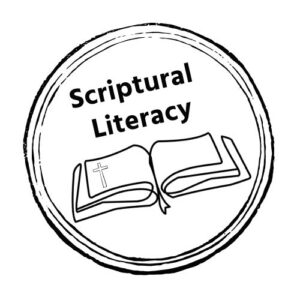“If you make my word your home, you will indeed be my disciples.”
John 8:30 (New Jerusalem Bible)

A few months ago we hosted a discussion for our BeADisciple instructors that featured our resident theologian, Michael D. Beardslee PhD, on the topic of biblical literacy.
We discussed how being biblically literate was distinct from merely knowing a bunch of biblical facts or quoting isolated verses. The history of the church, for example, is replete with bad-case uses of the Bible: pro-slavery pastors (including Methodists) arguing that abolition denied the Bible’s authority; witch hunts; or any of the many cases where the Bible was used to legitimate violence. Consider the many failed prophecy movements, or the times preachers used Scripture to extort their congregations.
Scriptural literacy is not about how much one reads the Bible, but rather about how the Bible is being read. The journey toward scriptural literacy includes delving into the integrity of God’s Word, the meaning of Scripture, and the application of different perspectives to ensure we avoid distorting that message in our teaching and in your learning.
Practicing and growing in your biblical literacy can help you hone the skills necessary to analyze and discern the various interpretations of the Bible, including both accurate and inaccurate ones.
Perspectives in Cultivating Scriptural Literacy
So, how do we practice the skills that help us ferret out good versus bad interpretations of the Bible? To begin with, we pay attention to at least three overall perspectives as we read a passage:
- Biblical – What does a passage mean within the context of the entire Bible?
- Historical – What did a passage mean for its author and its audience at the time it was written?
- Linguistic – What is communicated in the original languages that our translations miss?
We can also read theology and cultivate the muscles for biblical thinking. We should look at different critical perspectives–how does the text sound to somebody different from me? How does someone with a different perspective challenge my grasp of the Bible’s meaning?
Scriptural literacy is not merely about avoiding distorted readings of the Bible—it’s also about listening and about fostering a posture that refuses to see our interpretation as the final word.
A biblically literate reader understands that our grasp of Scripture is always unfinished. It’s never complete. And by grafting these different and new contexts and perspectives into our understanding of Scripture, we convey that the Bible remains a living text with the power to trouble us and the power to sanctify.
We are “moving on to perfection.”
BeADisciple’s commitment to Scriptural Literacy for 2025
We chose our focus for the year to be scriptural literacy, and our BeADisciple instructors have worked hard to create courses that exercise the muscle of scriptural literacy. Take a look at the courses below and prayerfully consider which one God might be calling you to explore.
The Scriptural Literacy courses

Dr. Michael Beardslee is the Advanced Christian Studies and LMS Administrator. He manages partnered certifications such as the Wesley Academy and most things related to BeADisciple’s learning management system, Blackboard.







